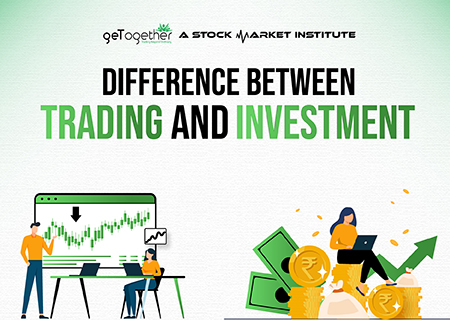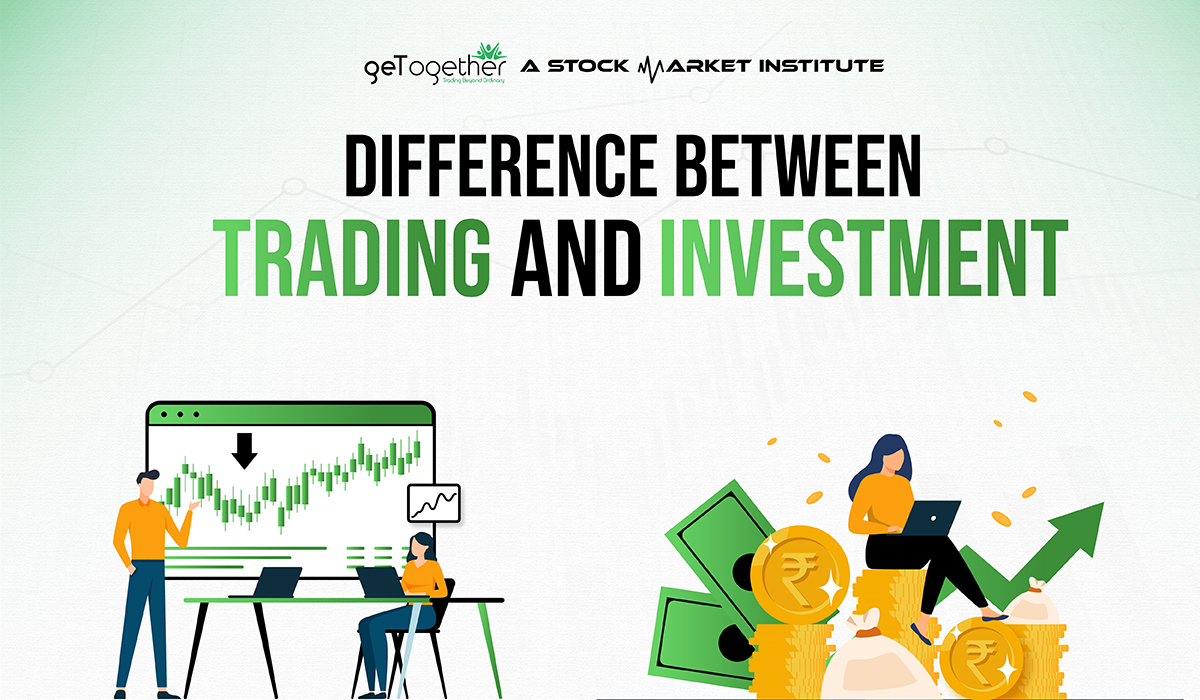Difference Between Trading and Investment


Table of Contents
ToggleOverview
The stock market of India has always been an exciting place for people to make money. But, there are times when people with little or no knowledge of the stock market fail to differentiate between trading and investment. Both trading and investment in the stock market involve buying and selling of stocks. But, their objectives and functioning are poles apart from each other.
Trading and investment have different objectives and both require different types of knowledge. In this blog, we’ll dive deep into the difference between trading and investment. It will help you recognize your goals for putting money in the stock market.
What is Trading?
It is the process of purchasing and selling securities, such as stocks, bonds, or commodities, on the stock market with the main objective of quickly booking profits. By timing their trades and utilizing specialized technical analysis, charts, and patterns, traders make their profit from price movements. Traders prioritize making immediate profits over the long-term prospects of the businesses they work with.
What is Investment?
On the contrary, purchasing securities with the goal to hold them for a lengthy period of time, typically years or decades, is investing. Fundamental analysis, which looks at the company’s financial health, potential for future growth, and competitive advantages, is the foundation upon which investors base their decisions. The primary goals of investing, with an emphasis on factors like dividends and steady profits, are the growth for the long-term and for the improvement of wealth.
Similarities of Investing and Trading

While both trading and investment have completely different objectives and strategies, they have some similarities too. After all, both are for making money from the same financial market.
- Involvement in the Financial Market: Both trading and investment are done in the same type of market. There is no financial or securities market solely made for either of them.
- Market Analysis: Market analysis with any of the methodologies is important. Be it fundamental used by the investors or the technical analysis used by traders, it is important to have a good hold on the market. Know where the market is going in current situations and what can trigger its movement more.
- Risk Management Techniques: Irrespective of your trading or investment approach, you are required to follow risk management strategies. Though investment is comparatively less risky, it doesn’t mean that risk management isn’t needed. Traders need to learn where to put stop loss and when to book profits without getting troubled. On the contrary, investors need to learn to diversify their portfolios. They need to think wisely in distributing their capital in different securities.
- Never-Ending Learnings: Learning and growth opportunities never in stock make.t for both traders and investors. One should never stop expanding their knowledge for the betterment of the results they are getting currently.
Key Differences Between Investing and Trading

Trading and investment are both strategies to make money from the securities market. Despite having the same agenda, they differ in the methodology from the viewpoint of time frame, strategies, capital, psychology, etc. Here’s a detailed differentiation between trading and investment:
| Factor | Trading | Investment |
| Time Frame | Short term | Long-term |
| Type of Analysis | Majorly done with the help of technical analysis that includes price action and chart analysis | Majorly done with the help of fundamental analysis that requires a detailed study of the financials of the company |
| Aim | Aim of short-term gains | Aim for long-term wealth accumulation with compound gains |
| Time horizon | Usually done within a constrained time frame of minutes, days, or weeks. | Usually done with far-sighted vision that includes more than a year |
| Type of returns | Profit within the market movements | Dividends, stock splits, bonuses, etc. |
Apart from all this, risk levels differ greatly in both trading and investment. Investment though is not completely safe if done blindfoldedly, yet it is far safer than short-term trading. The chances of your capital nullifying are higher in short-term trading. Whereas, in the end, both require dedicated study combined with detailed analysis. Otherwise, the market has all the capabilities to vanish your money whereas, when you learn the methodologies of trading and invest well, you learn to make profits out of any market movement.
Difference on the Basis of Time Frames
Successful trade requires a deep understanding of technical analysis, chart analysis, and market indicators. Alongside, It is mostly based on trade theories that experts in the industry curate after spending a handful of time in the market. It requires the capacity to react swiftly to market changes and execute trades at the right time to book significant profits. To keep up with the stock market trends, one must continually conduct research on market trends, which has a steep learning curve.
Whereas, for successful investment, one needs to understand fundamental research, financial data, and how the economy affects the stock market. Alongside this, investing requires analyzing the financial data of the company chosen to invest. While research is also important, investors frequently care more about a company’s long-term success than they do about short-term price fluctuations. It can be said that returns in investing are subject to the patience, faith, and analysis of the investor in the company chosen.
Also Read: Multiple Time Frame Analysis
Difference on the Basis of Risk Factors and Impact of Market Volatility
Entering the market as a trader without proper knowledge is like hitting an Axe on own foot. The degree of volatility and risk involved in trading is quite higher than in investing. But, if traders apply adequate risk mitigation strategies, they have a very low risk of losing their money. Therefore it is important for traders to learn thoroughly about the stock market from the experts first and then start trading. Due to the short-term nature of trading, adjustments in market mood, news, and unseen events can sometimes have an immediate impact on holdings.
Despite having some risk, investing is generally regarded as being less dangerous than trading. When investors are concentrated on the fundamental and long-term objectives of the company, they are less susceptible to short-term market changes and better prepared to manage them. Hence, there is a control on the emotions, if you are an investor.
Difference on the basis of Brokerage, Taxes, and Costs
Before the emergence of digital resources and platforms, trading costs like: transaction fees, commissions, and taxes were expensive. Brokerages are currently quite low as a result of the massive amount of digital platforms for individual investors. Although, it is always advisable for the trader to choose a safe platform for trading that doesn’t take away the maximum of their earnings in the name of the brokerage.
Longer-term holdings of investments result in lower transaction costs. The fact that long-term capital gains in India are taxed at a lower rate than short-term gains is another tax benefit for investors who maintain their position for longer than a year.
Difference on the basis of Trade Psychology and Investment Psychology
In trading, the stress and anxiety levels of traders can rise as a result of a busy daily schedule. Traders may be overtaken by fear, greed, and anxiety when making split-second judgments, which may impair their judgment and lead them to emotional decision rather than logical and practical one. Traders need to master their emotions to conquer the stock market, this cannot be learned overnight, instead one needs to develop patience and try to identify the thin line between greed and gains.
Investors can adopt a more patient approach and method due to the large range of time they have at their end. By concentrating on the underlying realities of the stock, they can keep a higher perspective and prevent emotional responses to sudden market movements.
What’s more profitable, Trading or Investing?

It is typically not possible to differentiate trading and investing based on the criteria of profits. Both have their own share of risks and rewards. Trading involves greater capital gains due to the short-term movement of the market. Whereas it also involves greater risks involved with greater capital.
Hefty capital is required to make good profits via trading. This increases the risk of losing that capital too. Trading psychology is of utmost importance in derivatives and intraday trading.
On the contrary, investing requires the utmost patience. Long-term gains are possible with good research, but sudden market downfalls during the target take a good toll on investors’ trade psychology.
Bottom Line
In conclusion, there are two separate ways to enter in the Indian stock market: trading and investing. Both are the great ways to make your money work for you. The Indian stock market offers a wide variety of possibilities, many of which promise financial gain and success. Although trade and investment take distinct routes, both have an impact on market dynamics. A market observer is aware of the advantages and disadvantages of each tactic and attempts to find a balance by using a measured and knowledgeable approach.
While investing includes a long-term commitment to companies with strong fundamentals, It is characterized by short-term speculation and a focus on in-depth technical analysis. Before deciding between trading and investment, people should carefully assess their financial goals, level of risk tolerance, and time horizon. Both strategies offer advantages and disadvantages. In the end, success in navigating the dynamic and always-changing world of the Indian stock market depends on taking a balanced and knowledgeable approach.
FAQ
1. Trading or Investing: which is riskier?
Trading is often riskier due to its short duration and reliance on market volatility. It entails greater unpredictability and therefore proactive risk mitigation. Investing is less hazardous since it focuses on long-term wealth growth and takes advantage of the market’s stability over time.
2. Can one be both a trader and an investor?
Yes, you can be a trader and an investor. Many people participate in both activities, with various tactics and periods for each. They may invest in long-term prospects while actively trading to profit from short-term market swings.
3. How do market conditions affect strategies?
Market conditions greatly impact strategy. During bull markets, investors may look for long-term growth prospects, whilst traders may seek momentum plays. During bad markets, investors may employ defensive methods, whilst traders may seek shorting opportunities or volatility-based strategies.
4. How does taxation vary for traders?
Traders often face higher short-term capital gains tax rates than investors. Traders can deduct trading-related expenses from their taxable income. Traders should seek counsel from tax professionals as tax regulations differ by jurisdiction.
5. Primary goals: trading vs. investing?
The fundamental goal of trading is to profit from short-term market volatility, whereas investing seeks long-term wealth creation and financial stability through capital appreciation, dividends, and interest income.
6. Timeframes: trading vs. investing?
Trading comprises short-term timescales ranging from minutes to days, whereas investing often lasts years to decades and focuses on asset growth over time.
7. Difference between trading and investing?
Trading is the frequent purchasing and selling of assets to profit from short-term price swings, whereas investing is the purchase of assets with the goal of holding them for the long term to gain from overall market growth.
8. Key skills for trading and investing?
Involves technical analysis, risk management, and discipline. Investing requires fundamental analysis skills, patience, and the capacity to weather market volatility.
9. Best instruments for trading and investing?
Common trading instruments include stocks, options, currencies, and commodities. Stocks, bonds, mutual funds, and real estate are common investments, depending on personal goals and risk tolerance.
10. Which offers better returns: trading or investing?
Trading might potentially provide larger rewards in the near term, but it also entails greater risk. Investing often gives more steady and predictable long-term returns by harnessing compounding and market growth.
CATEGORIES



 Facebook
Facebook Instagram
Instagram Youtube
Youtube
